Ampholytes Study guides, Class notes & Summaries
Looking for the best study guides, study notes and summaries about Ampholytes? On this page you'll find 17 study documents about Ampholytes.
All 17 results
Sort by
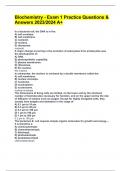
-
Biochemistry - Exam 1 Practice Questions & Answers 2023/2024 A+
- Exam (elaborations) • 10 pages • 2024
-
- $14.28
- + learn more
Biochemistry - Exam 1 Practice Questions & Answers 2023/2024 A+ In a bacterial cell, the DNA is in the: A) cell envelope. B) cell membrane. C) nucleoid. D) nucleus. E) ribosomes. nucleoid A major change occurring in the evolution of eukaryotes from prokaryotes was the development of: A) DNA. B) photosynthetic capability. C) plasma membranes. D) ribosomes. E) the nucleus the nucleus In eukaryotes, the nucleus is enclosed by a double membrane called the: A) cell membrane. B) nuc...
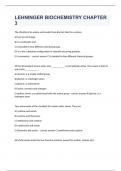
-
Test Bank for Lehninger Principles of Biochemistry 7th Edition by Nelson (complete, questions/answers/rationales)
- Exam (elaborations) • 42 pages • 2023
-
Available in package deal
-
- $14.99
- + learn more
The chirality of an amino acid results from the fact that its α carbon: A) has no net charge. B) is a carboxylic acid. C) is bonded to four different chemical groups. D) is in the L absolute configuration in naturally occurring proteins. E) is symmetric. C) is bonded to four different chemical groups. Of the 20 standard amino acids, only ___________ is not optically active. The reason is that its side chain ___________. A) alanine; is a simple methyl group B) glycine; is a hydrog...
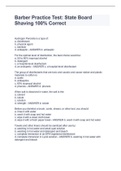
-
Barber Practice Test: State Board Shaving 100% Correct
- Exam (elaborations) • 14 pages • 2023
-
Available in package deal
-
- $14.99
- + learn more
Permanent haircolor creates a: a. chemical change b. physical change c. elemental change d. compound change - ANSWER a. chemical change Hard water can be softened by distillation or by the use of: a. sodium carbonate b. sodium chloride c. magnesium salts d. calcium salts - ANSWER a. sodium carbonate Only aqueous (water) solutions have: a. hydrogen b. pH c. oxygen d. surfactants - ANSWER b. pH Compared to skin and hair, water is: a. the same pH b. 10 times more acidic c. ...
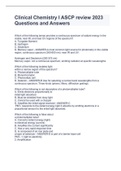
-
Clinical Chemistry I ASCP review 2023 Questions and Answers
- Exam (elaborations) • 87 pages • 2023
-
Available in package deal
-
- $16.49
- + learn more
Which of the following lamps provides a continuous spectrum of radiant energy in the visible, near IR, and near UV regions of the spectrum? A. Tungsten-filament B. Hydrogen C. Deuterium D. Mercury vapor - ANSWER-A most common light source for photometry in the visible region. continuous spectrum (360-800 nm). near IR and UV. Hydrogen and Deuterium (200-375 nm) Mercury vapor- not a continuous spectrum, emitting radiation at specific wavelengths Which of the following isolates light ...
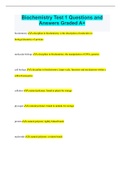
-
Biochemistry Test 1 Questions and Answers Graded A+
- Exam (elaborations) • 28 pages • 2023
-
- $9.99
- + learn more
Biochemistry Test 1 Questions and Answers Graded A+ biochemistry a discipline in biochemistry; is the description of molecules in biology/chemistry of proteins molecular biology a discipline in biochemistry; the manipulation of DNA, genetics cell biology a discipline in biochemistry; larger scale, functions and mechanisms within a cell/cell energetics cellulose a natural polymer; found in plants for storage glycogen a natural polymer; found in animals for storage protein a natural polymer; ...
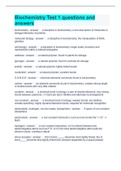
-
Biochemistry Test 1 questions and answers
- Exam (elaborations) • 12 pages • 2023
-
Available in package deal
-
- $19.49
- + learn more
Biochemistry Test 1 questions and answers biochemistry a discipline in biochemistry; is the description of molecules in biology/chemistry of proteins molecular biology a discipline in biochemistry; the manipulation of DNA, genetics cell biology a discipline in biochemistry; larger scale, functions and mechanisms within a cell/cell energetics cellulose a natural polymer; found in plants for storage glycogen a natural polymer; found in animals for storage p...

-
Gr11 Acid-Base Reactions & Redox Reactions
- Interview • 16 pages • 2022
-
Available in package deal
-
- $2.68
- + learn more
Detailed notes on Acid-Base Reactions and Redox Reactions Based on IEB syllabus -Acids -Bases -Conjugate Acid-base Pairs -Ampholytes -Acid-Base Reactions -Acid-Base Indicators -Acid-Base Titrations -Redox Reactions -Oxidation Number -Balancing Redox Reactions
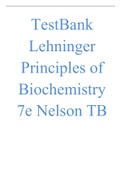
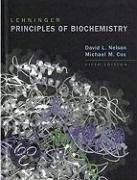
-
TestBank Lehninger Principles of Biochemistry 7e Nelson TB
- Exam (elaborations) • 560 pages • 2022
-
- $16.00
- + learn more
TestBank Lehninger Principles of Biochemistry 7e Nelson TB TestBank Lehninger Principles of Biochemistry 7e Nelson TBPage 1 1. In a bacterial cell, the DNA is in the: A) cell envelope. B) cell membrane. C) nucleoid. D) nucleus. E) ribosomes. 2. A major change occurring in the evolution of eukaryotes from prokaryotes was the development of: A) DNA. B) photosynthetic capability. C) plasma membranes. D) ribosomes. E) the nucleus. 3. In eukaryotes, the nucleus is enclosed by a d...
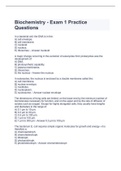
-
Biochemistry - Exam 1 Practice Questions and Answers 2022
- Exam (elaborations) • 10 pages • 2022
-
Available in package deal
-
- $13.99
- + learn more
In a bacterial cell, the DNA is in the: A) cell envelope. B) cell membrane. C) nucleoid. D) nucleus. E) ribosomes. nucleoid A major change occurring in the evolution of eukaryotes from prokaryotes was the development of: A) DNA. B) photosynthetic capability. C) plasma membranes. D) ribosomes. E) the nucleus the nucleus 00:34 01:10 In eukaryotes, the nucleus is enclosed by a double membrane called the: A) cell membrane. B) nuclear envelope. C) nucleolus. D) nuc...
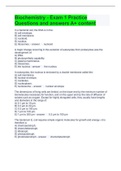
-
Biochemistry - Exam 1 Practice Questions and answers A+ content
- Exam (elaborations) • 10 pages • 2023
-
Available in package deal
-
- $18.49
- + learn more
In a bacterial cell, the DNA is in the: A) cell envelope. B) cell membrane. C) nucleoid. D) nucleus. E) ribosomes. nucleoid A major change occurring in the evolution of eukaryotes from prokaryotes was the development of: A) DNA. B) photosynthetic capability. C) plasma membranes. D) ribosomes. E) the nucleus the nucleus In eukaryotes, the nucleus is enclosed by a double membrane called the: A) cell membrane. B) nuclear envelope. C) nucleolus. D) nucleoplasm. E) nucl...

That summary you just bought made someone very happy. Also get paid weekly? Sell your study resources on Stuvia! Discover all about earning on Stuvia


